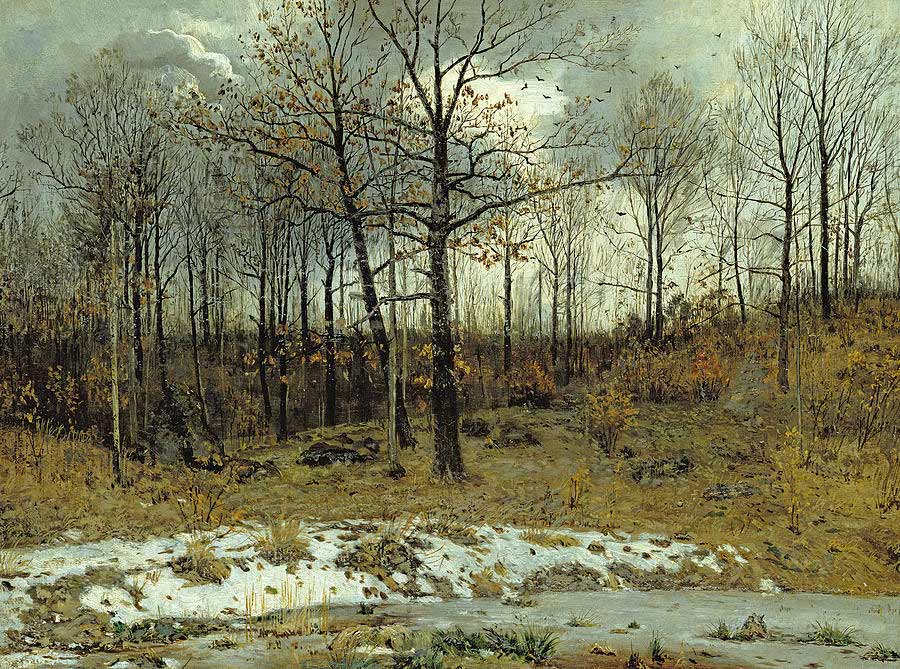And I, what fountain of fire am I among
This leaping combustion of spring?
—D.H. Lawrence
I’m dreading the arrival of spring. It’s not that I prefer winter. But there’s something about spring that gives me pause. “You mention spring’s delaying—I blamed her for the opposite,” Emily Dickinson wrote, in May 1866. “I would eat evanescence slowly.” That’s me in a nutshell, here in Dickinson’s Amherst where I live, eating evanescence slowly. Dickinson is the great poet of the torments of spring, it seems to me, when everything has thawed—except us. “A Pang is more conspicuous in Spring,” she writes, “In contrast with the things that sing.”
Remember that old song “Spring Can Really Hang You Up the Most”? Betty Carter gave it an aching rendition at her club dates back in the Eighties, when my wife and I were living in New York. You know the party’s over, she sings, “when you keep praying for snow to hide the clover.” Fran Landesman, an associate of the Beat poets, wrote the song. According to her obit in the Times, the song “sprang from Ms. Landesman’s asking jazz musicians to put T.S. Eliot’s phrase ‘April is the cruelest month’ into their own words.”
I remember another spring when impeachment was in the air. The tennis courts at Earlham College, the Quaker school in Richmond, Indiana, where my father taught chemistry, were flooded each winter for ice-skating. When spring came, I played tennis with the college librarian, Evan Farber. Once, we played doubles with our congressman, David W. Dennis. A very conservative Republican, Dennis was on the Judiciary Committee during the Watergate hearings. We proposed a wager. If we won, Dennis would vote to impeach Nixon. We won. Dennis voted against all five articles of impeachment.
I attended Dennis Junior High School, named, I think, for the congressman’s father. The spring of seventh grade, I won the Daughters of the American Revolution award for excellence in history. I can still recite all ninety-two counties of Indiana. Adams, Allen, Bartholomew, Benton, Blackford, Boone, Brown. Our Indiana history textbook, mimeographed and battered by long use, listed “Indianapolis” among other supposedly “Indian words.” It meant, according to the textbook, “city of the Indians.” When I challenged the teacher that it wasn’t an Indian word, she said, “Just learn what’s in the book!”
Spring meant the annual school skate at Melody Skateland, across the G Street Bridge (“The G-String Bridge,” we wittily called it) over the Whitewater River. I lived for the school skate, something like a prom held on a rink, but I also dreaded it, fearing, as I still do, rejection, dreading, as I still do, spring. The first couples-skate—roller-skating—was the Hokey Pokey. You were part of a couple but you didn’t hold hands, at least not in a serious way. The second couples-skate was the final skate of the evening. The lights were dimmed and a romantic song was played, like Elvis’s “It’s Now or Never.” We started by holding hands, Suzy Dwyer and I, but by the end of the song I had my arm around her. That’s what it’s all about.
Dickinson has another downbeat spring poem that begins, “I dreaded that first Robin so.” In the poem, she calls herself “The Queen of Calvary.” When the poet Randall Jarrell walked into the path of an oncoming car in Chapel Hill, North Carolina, in 1965, he was writing an essay about Dickinson called “The Queen of Calvary.” Jarrell is buried in the Quaker cemetery in Greensboro, across the street from Guilford College, where my father taught after his stint at Earlham. Jarrell’s widow, Mary, a friend of my German grandmother, gave me Jarrell’s copy of Rilke’s poems, a few of which he translated with the help of his friend Hannah Arendt.
A few years ago, I came across an oddly familiar line in a letter from Arendt to Martin Heidegger, dated April 22, 1928. She closed the letter with the words, “And with God’s will / I will love you more after death.” There was an echo there, but what was it? Suddenly, it came back to me. “Why, that’s from my favorite sonnet by Mrs. Browning!” I had played Mitch, the Karl Malden role, in an Earlham College production of A Streetcar Named Desire, circa 1973. Blanche reads aloud the inscription on Mitch’s silver cigarette case: “And, if God choose, / I shall but love thee better after death!”
What happened there? Arendt, twenty-two at the time when she was enthralled with Heidegger, had actually quoted Rilke’s German translation of the Browning poem. Unaware that it was a well-known poem translated by a well-known poet, Elzbieta Ettinger, the author of a 1995 exposé of the Heidegger–Arendt affair, had rendered it back into her own English, adding, for lagniappe, that it expressed Arendt’s death wish.
Advertisement
“So you aren’t coming now—I think I understand,” Arendt writes Heidegger. “But still I have been anxious in the last few days.” She sounds a little like Dickinson’s Fly writing to her Bee in the wonderful poem that begins “Bee! I’m expecting you!” It’s another poem about the coming of spring. Fly is awaiting Bee, who is late arriving. “You’ll get my Letter by / The seventeenth; Reply / Or better, be with me— / Yours, Fly.”
After Elizabeth Barrett Browning’s death in 1861, Emily Dickinson wrote to her friend Samuel Bowles, who was heading to Italy: “If you touch her Grave, put one hand on the Head, for me—her unmentioned Mourner.” The Brownings had arrived in Italy during the spring of 1847, according to Virginia Woolf’s beguiling biography of Flush, Mrs. Browning’s cocker spaniel. Ah, to be in Italy in mating season. And better yet, to be a dog. “He felt younger, spryer than he had done these many years.” I’m almost ready for spring.



